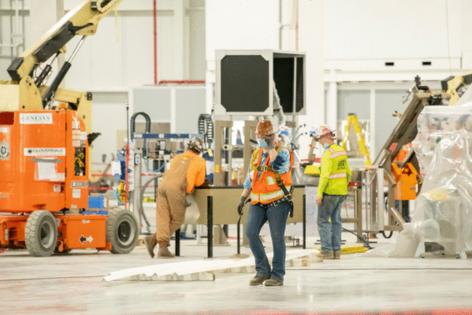Economists say Michigan is in slow patch, but will pick up alongside US by 2027
Published in Business News
Softened tariffs and tax cuts are expected to boost both the Michigan and national economies with growth expected by 2027 at the latest, according to a new report by University of Michigan economists.
But import taxes and other policy under President Donald Trump will create some short-term pain for Michigan, researchers wrote in the 2026-2027 Michigan Economic Outlook report.
“Interpreting all of the official and unofficial data, we believe the state economy has hit a growth pause this fall, which we expect to persist through most of next year," according to the Michigan report. "The better news is that we believe the economic policy mix has recently become more supportive for Michigan, and we expect growth to pick up in 2027."
Economists have rosier expectations for the U.S. economy as a whole.
"Moderate tax cuts, less restrictive monetary policy, and the end of the shutdown will set the economy on a steadier growth path by early next year," researchers wrote.
The University of Michigan experts couched optimistic predictions with a big caveat: "With the data blackout thanks to the longest federal government shutdown, assessing an already complicated economy feels more like reading tea leaves this time.”
Michigan will be up 36,700 payroll jobs this year, economists estimated. The state will be down 2,000 jobs next year before 11,300 are added in 2027 "as tax cuts work their way through the economy, interest rates decline modestly, and a more supportive policy mix begins to kick in."
The economists predict 2.4% growth in the U.S. real gross domestic product next year, then 2% growth in 2027. The unemployment rate will rise slightly, then remain stable through 2027, according to the report.
"Our outlook for Michigan’s economy may seem underwhelming, but these sorts of projections are likely to become the norm in the years to come unless there are fundamental changes to demographic trends," the economists wrote. "We have cautioned for years that Michigan’s aging and slowly growing population would eventually put a speed limit on job creation. In our judgment, that long-term future has now arrived."
Trump's repeal of electric-vehicle friendly policy "will cost Michigan jobs in the short run," economists wrote, but the end of greenhouse gas limits on vehicles "ought to boost the Detroit Three's share of the auto market over the longer term."
"Likewise, we have not been shy in sharing our previous estimates that the Trump Administration’s tariff policy would end up reducing employment in Michigan’s auto sector. Yet recent changes such as the extension of rebates on parts tariffs for domestically assembled vehicles have shifted our estimate of the tariffs’ eventual impact on domestic auto production from a small negative to a small positive," economists wrote. "Of course, these policy changes come at a cost: the tariffs will raise vehicle prices for consumers, while the elimination of CAFE standards will lead to higher vehicle emissions.
"The Michigan report was written by Jacob T. Burton, Gabriel M. Ehrlich, Donald R. Grimes, and Michael R. McWilliams. The U.S. report was written by Burton, Ehrlich, Grimes, Daniil Manaenkov, Niaoniao You and Yinuo Zhang.
©2025 www.detroitnews.com. Visit at detroitnews.com. Distributed by Tribune Content Agency, LLC.












Comments